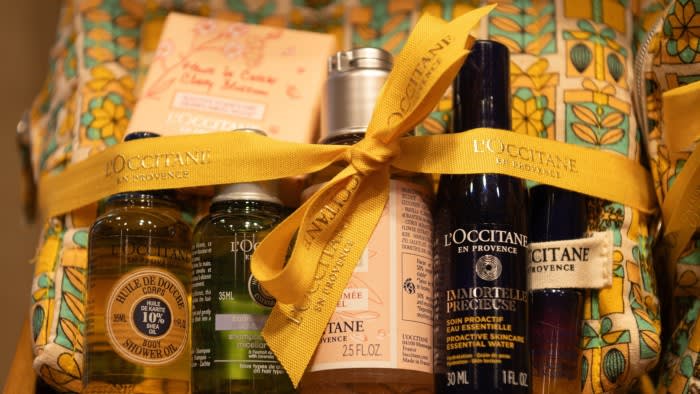Unlock the Editor’s Digest for free
Roula Khalaf, Editor of the FT, selects her favourite stories in this weekly newsletter.
Hardly a day goes by without a company that is listed in one place pondering the value it could unlock if only it were listed in another. Oil companies are no strangers to this phenomenon, with TotalEnergies and Shell both eyeing the premium they might enjoy in the US.
Hong Kong-listed high-end consumer groups are another constituency fretting about the impact of their chosen venue. A €6.5bn bid for Hong Kong-listed L’Occitane has now given its investors the chance to unlock part of the skincare and beauty group’s listings arbitrage.
It is not hard to see why Reinold Geiger, who owns 72 per cent of L’Occitane, is taking a second run at the group. There is an obvious way for the Austrian billionaire to make a buck. L’Occitane trades at 15 times next year’s earnings; Paris-listed L’Oréal is above 30, according to S&P Capital IQ. Buying out minorities, delisting the stock and then relisting it in Europe or the US could narrow that gap.
Not all of L’Occitane’s discount is related to its Hong Kong listing. The L’Occitane brand itself is looking tired, with its sales excluding currency fluctuations up 2.6 per cent in the nine months to the end of December. The group overall managed 25 per cent growth, mainly thanks to Sol de Janeiro, a small but fast-growing brand. That gives the whole enterprise a riskier — and less valuable — business model than massive multi-brand stables such as L’Oréal.
Even so, a change of venue would help. A Hong Kong listing has turned out to be a drag for foreign companies, which tend to suffer from a lack of research coverage and are excluded from both local and European indices. In an effort to address this, luxury yachtmaker Ferretti now has a secondary listing in Milan. Prada is considering a similar move.
The fly in the lavender-scented ointment is, of course, that L’Occitane shareholders are being offered a mere slice of the spoils. Geiger’s bid only values the group at 18 times next year’s earnings.
It is not clear that there is much of an alternative. Absent a takeover bid, shifting the company’s listing, as suggested by activist Butler Hall, would be an uphill struggle. That, plus a 30 per cent premium to the undisturbed share price, has been enough to convince almost 40 per cent of the free float to back the bid.
That is still a way off from the 90 per cent Geiger needs to squeeze out minorities. But he may have handed out just enough cream to avoid a stink.


